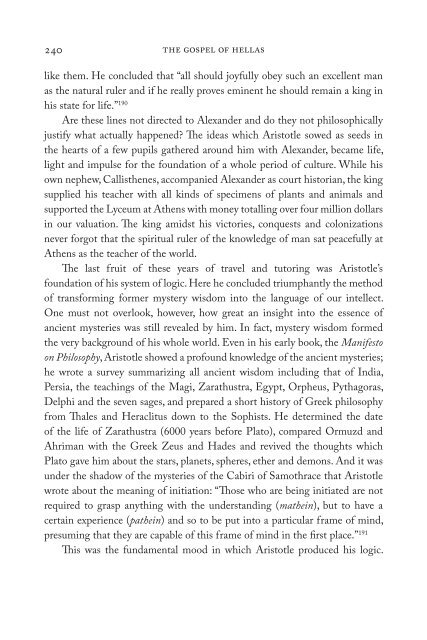The Gospel of Hellas - Research Institute for Waldorf Education
The Gospel of Hellas - Research Institute for Waldorf Education
The Gospel of Hellas - Research Institute for Waldorf Education
Create successful ePaper yourself
Turn your PDF publications into a flip-book with our unique Google optimized e-Paper software.
0 the gospel <strong>of</strong> hellas<br />
like them. He concluded that “all should joyfully obey such an excellent man<br />
as the natural ruler and if he really proves eminent he should remain a king in<br />
his state <strong>for</strong> life.” 190<br />
Are these lines not directed to Alexander and do they not philosophically<br />
justify what actually happened? <strong>The</strong> ideas which Aristotle sowed as seeds in<br />
the hearts <strong>of</strong> a few pupils gathered around him with Alexander, became life,<br />
light and impulse <strong>for</strong> the foundation <strong>of</strong> a whole period <strong>of</strong> culture. While his<br />
own nephew, Callisthenes, accompanied Alexander as court historian, the king<br />
supplied his teacher with all kinds <strong>of</strong> specimens <strong>of</strong> plants and animals and<br />
supported the Lyceum at Athens with money totalling over four million dollars<br />
in our valuation. <strong>The</strong> king amidst his victories, conquests and colonizations<br />
never <strong>for</strong>got that the spiritual ruler <strong>of</strong> the knowledge <strong>of</strong> man sat peacefully at<br />
Athens as the teacher <strong>of</strong> the world.<br />
<strong>The</strong> last fruit <strong>of</strong> these years <strong>of</strong> travel and tutoring was Aristotle’s<br />
foundation <strong>of</strong> his system <strong>of</strong> logic. Here he concluded triumphantly the method<br />
<strong>of</strong> trans<strong>for</strong>ming <strong>for</strong>mer mystery wisdom into the language <strong>of</strong> our intellect.<br />
One must not overlook, however, how great an insight into the essence <strong>of</strong><br />
ancient mysteries was still revealed by him. In fact, mystery wisdom <strong>for</strong>med<br />
the very background <strong>of</strong> his whole world. Even in his early book, the Manifesto<br />
on Philosophy, Aristotle showed a pr<strong>of</strong>ound knowledge <strong>of</strong> the ancient mysteries;<br />
he wrote a survey summarizing all ancient wisdom including that <strong>of</strong> India,<br />
Persia, the teachings <strong>of</strong> the Magi, Zarathustra, Egypt, Orpheus, Pythagoras,<br />
Delphi and the seven sages, and prepared a short history <strong>of</strong> Greek philosophy<br />
from Thales and Heraclitus down to the Sophists. He determined the date<br />
<strong>of</strong> the life <strong>of</strong> Zarathustra (6000 years be<strong>for</strong>e Plato), compared Ormuzd and<br />
Ahriman with the Greek Zeus and Hades and revived the thoughts which<br />
Plato gave him about the stars, planets, spheres, ether and demons. And it was<br />
under the shadow <strong>of</strong> the mysteries <strong>of</strong> the Cabiri <strong>of</strong> Samothrace that Aristotle<br />
wrote about the meaning <strong>of</strong> initiation: “Those who are being initiated are not<br />
required to grasp anything with the understanding (mathein), but to have a<br />
certain experience (pathein) and so to be put into a particular frame <strong>of</strong> mind,<br />
presuming that they are capable <strong>of</strong> this frame <strong>of</strong> mind in the first place.” 191<br />
This was the fundamental mood in which Aristotle produced his logic.

















